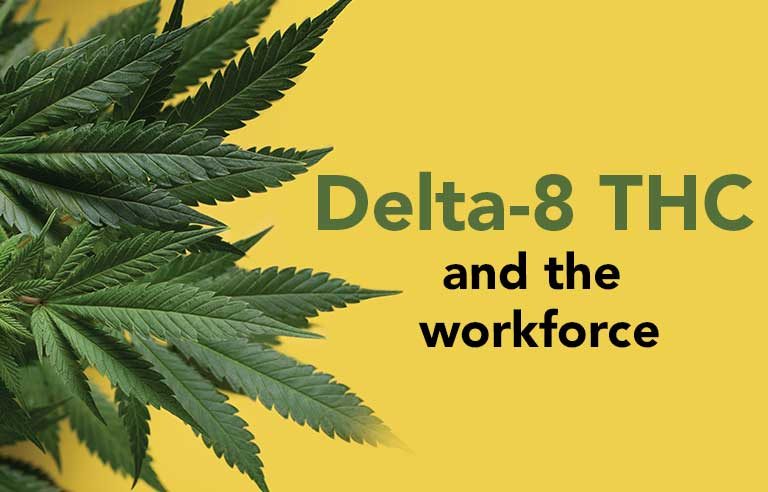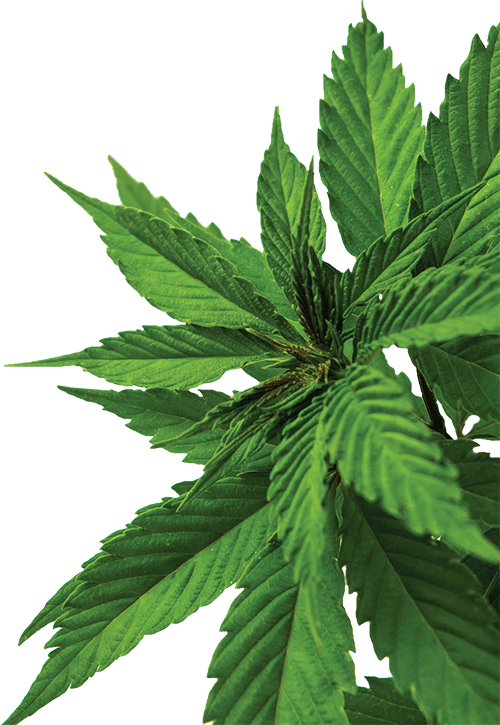Delta-8 THC and the workforce
Legal? Illegal? Here’s what’s known

Page 2 of 2
What actions have states taken more recently?
At press time, states that had banned or restricted products containing delta-8 THC included Colorado and Washington – where recreational and medicinal use of marijuana is legal.
Noting that the Revised Code of Washington views all compounds of THC as Schedule I substances, the Washington State Liquor and Cannabis Board in April issued a policy statement declaring that the production and sale of synthetically produced delta-8 products violates state law.
That same month, Vermont clarified that the manufacture and use of hemp products containing delta-8 are prohibited under the state hemp program, while the Kentucky Department of Agriculture declared delta-8 THC a Schedule I drug, stating that distributing products containing delta-8 is illegal and could prompt “potential expo-sure to criminal prosecution.”
Several other states have taken steps to regulate delta-8, including Michigan. In July, Gov. Gretchen Whitmer (D) signed legislation, effective Oct. 11, that regulates the chemical compound, allowing only licensed cannabis retailers to sell products containing delta-8 THC.
Rosman praised the action as a “very smart, progressive approach” to the issue.
“Consumers won’t have to worry about potential heavy metal contamination, chemical residues, residual sol-vents, microbiological contamination,” he said. “And they can be assured that the potency that is on the label is accurate.”
A recent analysis of 38 products containing delta-8 THC by the CBD educational platform Leafreport shows that the chemical compound wasn’t clearly listed on the label or product description of 13 of them (34%), while 68% contained the incorrect amount.
In September, the Centers for Disease Control and Prevention issued a Health Alert Network advisory addressing concerns related to unclear labeling of products containing delta-8. The agency reminds the public to “be aware of possible limitations in the labeling of products containing THC and CBD,” noting that labels displaying only the concentration of delta-9, but not total THC, “may underestimate the psychoactive potential.”
NSC, in a position statement, writes: “Requiring cannabis or cannabis-derived products to have accurate information on packaging will improve public safety and allow authorized users of cannabis to use it in a safe and appropriate manner. It is imperative that consumers know what they are putting into their body, and effective labeling requirements and oversight will directly benefit public health.”
What’s happening at the federal level?
Under an interim final rule published by the Drug Enforcement Administration in the Aug. 21, 2020, Federal Register, all synthetically derived THC remains a Schedule I controlled substance. Still, the Farm Bill doesn’t reference DEA having oversight authority, Caldwell said.
A DEA spokesperson told S+H that the agency was still reviewing public comments on the interim final rule and hadn’t yet made it final.
“As DEA is currently undergoing the rulemaking process regarding the implementation of the Agriculture Improvement Act of 2018 – which includes the scope of regulatory controls over marijuana, tetrahydrocannabinols and other marijuana-related constituents – we would be unable to comment on any impact in legality of tetrahydrocannabinols, delta-8 included, until the process is complete,” the spokesperson said. “We are in the process of reviewing thousands of comments and do not speculate on what could happen as a result.”

During a June 16 webinar presented in conjunction with lab services provider Quest Diagnostics, Caldwell said that “the world tilted on its axis in December of 2018 when the Farm Bill was passed,” as certain types of cannabis no longer were considered Schedule I substances.
One ripple effect was an impact on employer drug testing, Caldwell told S+H. For instance, the departments of Transportation and Health and Human Services don’t accept CBD or hemp use as a reasonable explanation for a positive test for marijuana.
Under federal regulations, motor carriers must conduct preemployment drug testing in addition to random testing. Employees who test positive are prohibited from performing safety-sensitive functions, which includes operating a commercial motor vehicle.
In February 2020, DOT issued a compliance notice offering caution about CBD products.
“It remains unacceptable for any safety-sensitive employee subject to the Department of Transportation’s drug testing regulations to use marijuana,” the notice states. “Since the use of CBD products could lead to a positive drug test result, Department of Transportation-regulated safety-sensitive employees should exercise caution when considering whether to use CBD products.”
Is delta-8 detectable in drug testing?
Laboratories under the federal drug testing program screen for delta-9. Caldwell said she is aware of at least one lab that performs specialized delta-8 testing.
“The question is: Is there a demand for it? That would have to be developed,” Caldwell said. “Do they have the ability? Sure. Most labs would. But it’s not widespread, if at all.”
With confusion surrounding the legality of delta-8 THC, therein lies another conundrum.
“Then, of course, the question is: What action do employers take if it is found in a specimen?” Caldwell said.
Post a comment to this article
Safety+Health welcomes comments that promote respectful dialogue. Please stay on topic. Comments that contain personal attacks, profanity or abusive language – or those aggressively promoting products or services – will be removed. We reserve the right to determine which comments violate our comment policy. (Anonymous comments are welcome; merely skip the “name” field in the comment box. An email address is required but will not be included with your comment.)

